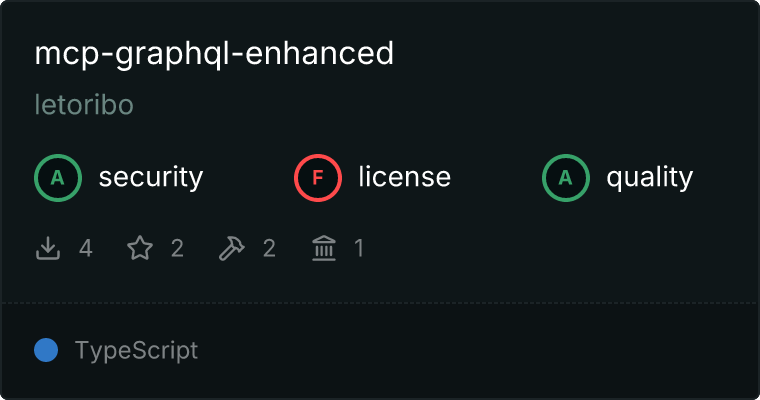# mcp-graphql-enhanced
[](https://glama.ai/mcp/servers/@letoribo/mcp-graphql-enhanced)
An **enhanced MCP (Model Context Protocol) server for GraphQL** that fixes real-world interoperability issues between LLMs and GraphQL APIs.
> Drop-in replacement for `mcp-graphql` — with dynamic headers, robust variables parsing, and zero breaking changes.
## ✨ Key Enhancements
* ✅ **Dual Transport** — Supports both **STDIO** (for local CLI/client tools) and **HTTP/JSON-RPC** (for external/browser clients).
* ✅ **Dynamic headers** — pass `Authorization`, `X-API-Key`, etc., via tool arguments (no config restarts)
* ✅ **Robust variables parsing** — fixes `“Query variables must be a null or an object”` error
* ✅ **Filtered introspection** — request only specific types (e.g., `typeNames: ["Query", "User"]`) to reduce LLM context noise
* ✅ **Full MCP compatibility** — works with **Claude Desktop**, **Cursor**, **Glama**
* ✅ **Secure by default** — mutations disabled unless explicitly enabled
---
## 💻 HTTP / Dual Transport
This server now runs in **dual transport mode**, supporting both the standard **STDIO** communication (used by most MCP clients) and a new **HTTP JSON-RPC** endpoint on port `6274`.
This allows external systems, web applications, and direct `curl` commands to access the server's tools.
| **Endpoint** | **Method** | **Description** |
| :--- | :--- | :--- |
| `/mcp` | `POST` | The main JSON-RPC endpoint for tool execution. |
| `/health` | `GET` | Simple health check, returns `{ status: 'ok' }`. |
### Resolving Port Conflicts (EADDRINUSE) and Automatic Port Selection
The server defaults to port `6274`. If you encounter an `EADDRINUSE: address already in use :::6274` error (common in local development due to stale processes), the server will automatically **increment the port and retry** (e.g., bind to `6275`, then `6276`, etc., up to 5 times).
This ensures the server starts successfully even when the default is blocked. **Always check the server logs for the final bound port** (e.g., `[HTTP] Started server on http://localhost:6275`) if your `curl` or client tool fails on the default `6274`.
To **force a specific port** (e.g., for guaranteed external firewall settings), you can still explicitly set the `MCP_PORT` environment variable:
### Testing the HTTP Endpoint
You can test the endpoint using `curl` as long as the server is running (e.g., via `npm run dev`):
```bash
# Test the health check (assuming the server bound to the default or found the next available port)
curl http://localhost:6274/health
# Example: Test the query tool via JSON-RPC (using port 6275 if 6274 was busy)
curl -X POST http://localhost:6275/mcp -H "Content-Type: application/json" -d '{"jsonrpc":"2.0","method":"query-graphql","params":{"query":"query { __typename }"},"id":1}'
## 🔍 Filtered Introspection (New!)
Avoid 50k-line schema dumps. Ask for only what you need:
```@introspect-schema typeNames ["Query", "User"]```
## 🔍 Debug & Inspect
Use the official MCP Inspector to test your server live:
```bash
npx @modelcontextprotocol/inspector \
-e ENDPOINT=https://api.example.com/graphql \
npx @letoribo/mcp-graphql-enhanced --debug
```
### Environment Variables (Breaking change in 1.0.0)
> **Note:** As of version 1.0.0, command line arguments have been replaced with environment variables.
| Environment Variable | Description | Default |
|----------|-------------|---------|
| `ENDPOINT` | GraphQL endpoint URL | `https://mcp-neo4j-discord.vercel.app/api/graphiql` |
| `HEADERS` | JSON string containing headers for requests | `{}` |
| `ALLOW_MUTATIONS` | Enable mutation operations (disabled by default) | `false` |
| `NAME` | Name of the MCP server | `mcp-graphql-enhanced` |
| `SCHEMA` | Path to a local GraphQL schema file or URL (optional) | - |
| `MCP_PORT` | Port for the HTTP/JSON-RPC server. | `6274` |
### Examples
```bash
# Basic usage
ENDPOINT=http://localhost:3000/graphql npx @letoribo/mcp-graphql-enhanced
# With auth header
ENDPOINT=https://api.example.com/graphql \
HEADERS='{"Authorization":"Bearer xyz"}' \
npx @letoribo/mcp-graphql-enhanced
# Enable mutations
ENDPOINT=http://localhost:3000/graphql \
ALLOW_MUTATIONS=true \
npx @letoribo/mcp-graphql-enhanced
# Use local schema file
ENDPOINT=http://localhost:3000/graphql \
SCHEMA=./schema.graphql \
npx @letoribo/mcp-graphql-enhanced
# Change the HTTP port
MCP_PORT=8080 npx @letoribo/mcp-graphql-enhanced
```
### 🖥️ Claude Desktop Configuration Examples
You can connect Claude Desktop to your GraphQL API using either the npx package (recommended for simplicity) or the Docker image (ideal for reproducibility and isolation).
### ✅ Option 1: Using npx
```bash
{
"mcpServers": {
"mcp-graphql-enhanced": {
"command": "npx",
"args": ["@letoribo/mcp-graphql-enhanced"],
"env": {
"ENDPOINT": "https://your-api.com/graphql"
}
}
}
}
```
### 🐳 Option 2: Using Docker (auto-pull supported)
```bash
{
"mcpServers": {
"mcp-graphql-enhanced": {
"command": "sh",
"args": [
"-c",
"docker run --rm -i -e ENDPOINT=$ENDPOINT -e HEADERS=$HEADERS -e ALLOW_MUTATIONS=$ALLOW_MUTATIONS ghcr.io/letoribo/mcp-graphql-enhanced:main"
],
"env": {
"ENDPOINT": "https://your-api.com/graphql",
"HEADERS": "{\"Authorization\": \"Bearer YOUR_TOKEN\"}",
"ALLOW_MUTATIONS": "false"
}
}
}
}
```
### 🧪 Option 3: Using node with local build (for development)
If you’ve cloned the repo and built the project (npm run build → outputs to dist/):
```bash
{
"mcpServers": {
"mcp-graphql-enhanced": {
"command": "node",
"args": ["dist/index.js"],
"env": {
"ENDPOINT": "https://your-api.com/graphql",
"ALLOW_MUTATIONS": "true"
}
}
}
}
```
## Resources
- **graphql-schema**: The server exposes the GraphQL schema as a resource that clients can access. This is either the local schema file, a schema file hosted at a URL, or based on an introspection query.
## Available Tools
The server provides two main tools:
1. **introspect-schema**: This tool retrieves the GraphQL schema or a filtered subset (via typeNames). Use this first if you don't have access to the schema as a resource.
This uses either the local schema file, a schema file hosted at a URL, or an introspection query.
Filtered introspection (typeNames) is only available when using a live GraphQL endpoint (not with SCHEMA file or URL).
2. **query-graphql**: Execute GraphQL queries against the endpoint. By default, mutations are disabled unless `ALLOW_MUTATIONS` is set to `true`.
## Security Considerations
Mutations are disabled by default to prevent unintended data changes. Always validate HEADERS and SCHEMA inputs in production. Use HTTPS endpoints and short-lived tokens where possible.
## Customize for your own server
This is a very generic implementation where it allows for complete introspection and for your users to do whatever (including mutations). If you need a more specific implementation I'd suggest to just create your own MCP and lock down tool calling for clients to only input specific query fields and/or variables. You can use this as a reference.